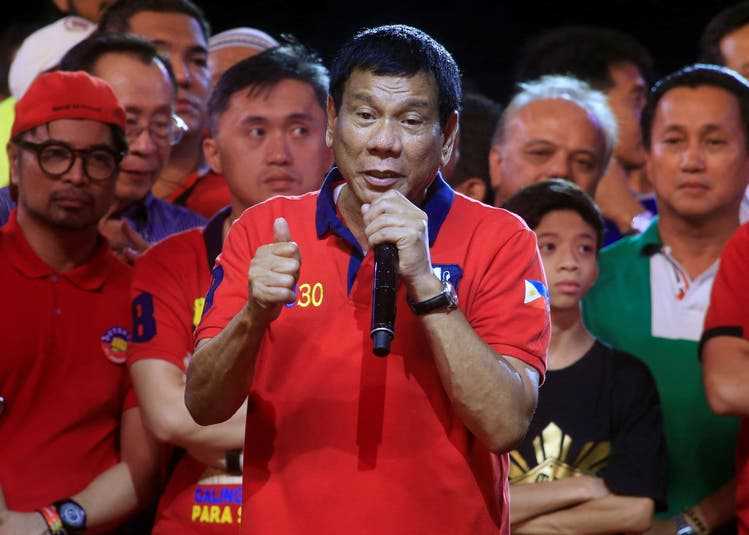The outgoing Philippine president is popular among his compatriots despite his bloody drug war. However, his authoritarian style of leadership will leave scars.
The dictator’s son Ferdinand “Bongbong” Marcos succeeds Rodrigo Duterte to the highest government office in the Philippines. His election sparked protests in May.
beginning of year Philippine President Rodrigo Duterte repeated to himself once in rage. “I will never, ever apologize for killing the bastards. Kill me, lock me up, I’ll never apologize.” Duterte, who is leaving office at the end of June, alluded to the estimated 30,000 deaths in his fight against drug-related crime in his usual martial terms.
Robert Garcia draws a grim balance. He had advised Duterte’s predecessor, Noynoy Aquino, at the time. He now works for the Human Rights Commission of the Philippines. Garcia says Duterte systematically attacked democratic institutions and taunted those who wanted to uphold free governance. One of Duterte’s greatest swords was an aggressive and vulgar rhetoric, with which he insulted and intimidated those who stood in his way. “This style of government has led many Filipinas and Filipinos to believe that they are living in an authoritarian regime again without a formal declaration being necessary,” says Garcia.

The populist Rodrigo Duterte is known for his direct, at times vulgar language.
Rodrigo Duterte, “Father of the Nation”
At the beginning of his tenure, hopes rested on Duterte. He presented himself as the first left-wing president of the Philippines who wanted to fight for the underprivileged and rebel against the ruling elites. His followers refer to him as “Tatay”, the popular father of the nation.
According to the polling institute Pulse Asia, his popularity has remained high across all demographic groups and has almost always been above the 75 percent mark for the past six years, although he has not kept many promises. This is how corruption that covers the land like mildew has worsened in recent years.
At least on one point however, Duterte delivered. He has brutally and ruthlessly followed the fight against drugs across the country. He had already made a name for himself as mayor of Davao, a city in the south of the Philippines. These “successes” are well received by Duterte’s countrymen. In a survey conducted by the polling institute Social Weather Stations in December 2019, eight out of ten Filipinas and Filipinos said they were satisfied with the measures.
“A cancer that needs to be cut out”
At the beginning of his tenure, Duterte had argued with grossly exaggerated figures on the drug problem in the Philippines to lay the foundation for his campaign. In the Philippines, drug use is likely to be below average compared to other Southeast Asian countries, says Steffen Bo Jensen from Aalborg University, who recently published a book about Duterte’s drug wars. Nevertheless, surveys show that the Filipino population perceives drugs as a problem.
Duterte’s message was therefore well received: Drugs are a danger to the Filipino people because dealers and users commit murder, crime and rape. In the worldview of the outgoing president, such “subjects” are a “cancer that needs to be cut out.”
Dead drug dealers and users are also a good thing because they help heal the Philippines. “It is not the law that ensures justice, but violence – the end justifies the means,” is how Jensen explains Duterte’s argument. A legal vacuum was created at the behest of the state. Only a few homicides have been prosecuted. As a result, however, the population’s trust in the rule of law fell.
The bulk of the victims are the most marginalized, vulnerable and at-risk Filipinas and Filipinos, ie the poorest of the poor. The leaders of the scene, on the other hand, got off scot-free.
The murders were mostly prepared in poorer quarters. Residents there served as “watchdogs”. They informed the police about drugs and wrongdoing. The lists of names created by the denunciations formed the basis for the anti-drug crusades. Mere allegations were enough to end up on the lists and possibly get killed.
Duterte thus followed the logic of authoritarian regimes. He created a climate of fear and distrust in the quarters. The once intact social relationships in the neighborhoods have gradually been destroyed because everyone had to decide who is friend and who is foe. This fear is reflected in surveys: 80 percent of Filipinas and Filipinos approve of the drug war. But 80 percent are also afraid of becoming a victim themselves.
Duterte remains blameless and popular
Duterte also sowed the seeds of fear and anxiety in the legal and political spheres. Senator Leila de Lima conducted drug war hearings in 2016 and denounced the extrajudicial killings. A little later she was arrested on charges of heading a drug ring and has been in prison ever since.
Among the high-ranking victims of Duterte is the Chief Justice of the Philippines, Maria Lourdes Sereno, who was in office until 2018. She had criticized Duterte and was then confronted with a fake impeachment procedure. In such a repressive environment, anyone would think twice before criticizing the President.
Duterte, on the other hand, need not fear legal prosecution. The Chief Prosecutor of the International Criminal Court in The Hague, Brit Karim Ahmad Khan was authorized last September to investigate Duterte for possible crimes against humanity. But with the election of Ferdinand Marcos Jr. as president and Duterte’s daughter Sara as vice president, it’s clear that the court will have a long history for the next six years will not have access to Rodrigo Duterte. On the contrary, he will leave the government palace on June 30 as an apparently blameless and respected president.
